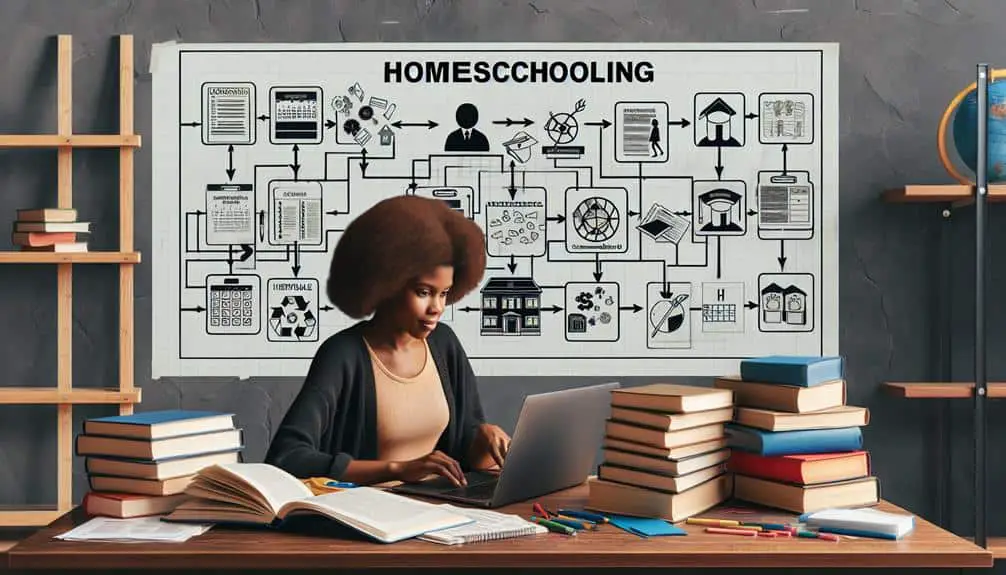Homeschooling laws require parental qualifications to guarantee you have the skills and knowledge for a high-quality education. Qualifications impact academic success and the overall quality of homeschooling outcomes. Parental involvement directly influences children's progress and development, shaping learning outcomes. These laws aim to maintain educational standards and uphold quality for homeschooled children. If you want to understand more about the impact of parental qualifications on homeschooling, there are additional insights awaiting you in the research provided.
Key Points
- Parental qualifications ensure effective academic instruction in homeschooling.
- Standards uphold quality education by requiring necessary skills and knowledge.
- Legal frameworks aim to guarantee parents have the ability to educate children effectively.
- Research shows a positive correlation between parental qualifications and academic achievement.
- State laws regulate homeschooling to ensure well-rounded education for children at home.
Importance of Parental Qualifications in Homeschooling Laws
Understanding the significance of parental qualifications in homeschooling laws is essential to ensuring the academic success and well-being of homeschooled children.
Parental experience plays a vital role in the effectiveness of homeschooling. Parents who've a background in education or have undergone training in teaching methods are better equipped to provide quality education to their children.
Educational standards are another crucial aspect to take into account. Parents need to meet certain educational requirements to guarantee they can effectively teach their children a curriculum that meets the standards set by the state. This helps ensure that homeschooled children receive a well-rounded education that's on par with traditional schooling.
Research indicates that parental qualifications positively correlate with the academic achievement of homeschooled children. By having parents who meet specific educational standards and possess relevant experience, the overall quality of homeschooling can be enhanced, leading to better outcomes for the students.
Legal Framework for Parental Qualifications
Within the legal framework surrounding homeschooling, parental qualifications serve as a fundamental aspect that dictates the ability of parents to educate their children at home. Parental responsibilities in homeschooling are often regulated by state laws that outline specific requirements parents must meet to homeschool their children. These requirements typically include educational standards that parents must demonstrate they can meet to guarantee their children receive a quality education.
Educational standards for parental qualifications in homeschooling laws vary from state to state but commonly involve criteria such as having a high school diploma or equivalent, passing standardized tests, or providing evidence of the ability to create and implement a curriculum. These standards aim to ensure that parents possess the necessary skills and knowledge to effectively educate their children at home. By establishing these qualifications, policymakers seek to uphold the quality of education provided to homeschooled children and make sure that parents are equipped to fulfill their educational responsibilities.
Ensuring Quality Education at Home
To guarantee a quality education at home, parents must meet specific state-mandated qualifications that demonstrate their ability to effectively educate their children. Parental involvement is essential in creating a conducive learning environment for homeschooling. State requirements make certain that parents have the necessary skills and knowledge to provide a high standard of education. These qualifications often include having a certain level of education themselves, completing teacher training courses, or submitting a curriculum plan for approval. By making sure that parents meet these qualifications, states aim to safeguard the quality of education children receive at home.
Moreover, parental involvement goes beyond qualifications; it encompasses active participation in their child's learning journey. Creating a supportive learning environment involves structuring lessons effectively, providing resources, and fostering a love for learning. Parents play a crucial role in tailoring education to their child's needs, interests, and learning style, which can lead to a more personalized and effective educational experience. Ultimately, by meeting state-mandated qualifications and actively engaging in their child's education, parents can ensure a quality homeschooling experience.
Impact on Childrens Academic Progress
The level of parental involvement in homeschooling directly impacts children's academic progress, influencing their learning outcomes and overall educational development. Research consistently shows that parental involvement in homeschooling plays a vital role in shaping a child's academic success. When parents actively participate in their child's education by providing educational support, creating structured learning environments, and offering guidance, children are more likely to excel academically.
Parental involvement goes beyond just teaching materials; it involves creating a conducive learning atmosphere at home, setting goals, tracking progress, and adapting teaching methods to suit the child's learning style. Studies indicate that children whose parents are actively engaged in their homeschooling tend to perform better on standardized tests, demonstrate higher levels of motivation, and exhibit greater confidence in their academic abilities. Educational support from parents can also help children develop essential skills such as critical thinking, problem-solving, and time management.
In essence, parental involvement in homeschooling is a key factor in determining a child's academic progress and overall educational success.
Addressing Concerns of Socialization
When contemplating homeschooling, it's essential to address concerns regarding socialization to better understand its impact on children's development. Socialization challenges are often cited as a drawback of homeschooling, with worries about limited opportunities for children to interact with peers. However, research suggests that homeschoolers can develop strong social skills through various avenues. Homeschooled children often participate in community activities, sports, and volunteer work, which provide ample opportunities for socialization outside traditional school settings.
Concerns about socialization can be alleviated by understanding that social skills aren't solely acquired in a classroom setting. Homeschooled children can develop excellent communication, problem-solving, and conflict resolution abilities through interactions with family members, neighbors, and community members. Additionally, homeschooling allows for more personalized socialization experiences, where children can engage with individuals of different ages and backgrounds in a less peer-dependent environment.




